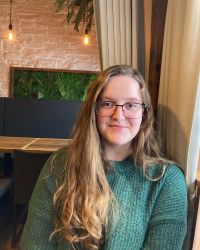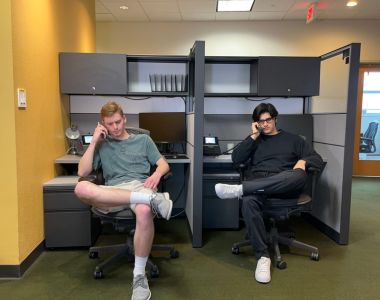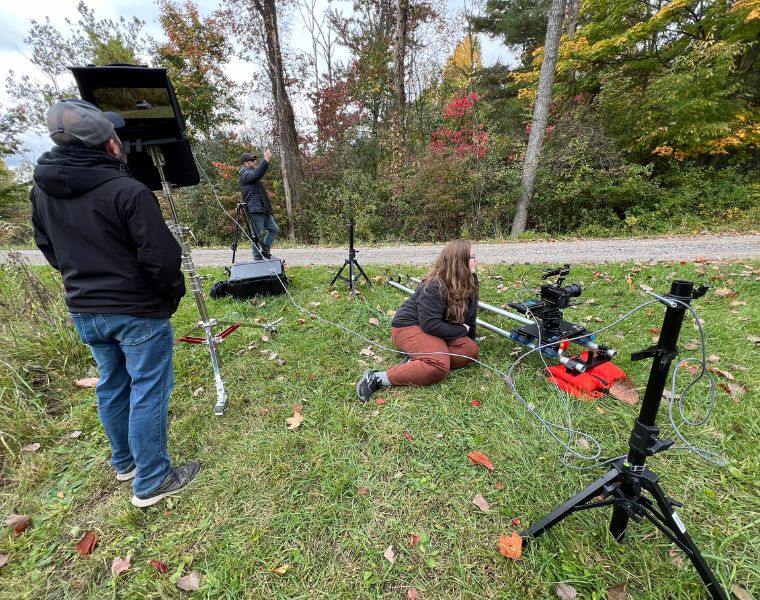You’ve likely seen our city on the big screen in films like Captain America: The Winter Soldier and Cherry (directed by brothers and former Case Western Reserve University students Joe and Anthony Russo). But did you know Cleveland also has a thriving independent filmmaking scene?
Film festivals celebrating different genres are held here throughout the year, including the heralded Cleveland International Film Festival, held annually in late March and April.
But up first is the Short. Sweet. Film Festival, which was founded by alumnus Mike Suglio (CWR ’09, MGT ’12) and former Case Western Reserve student Alex Pavloff. This year’s festival runs Feb. 28 through March 3, with films shown at Atlas Cinemas Shaker Square 6.
The connections to CWRU don’t end with the festival’s founders. Two students worked on films being shown Thursday, Feb. 29, during the Student Filmmaker’s Night. We caught up with both of them to learn about their experiences behind the camera.
Want to see their work? Purchase your tickets for the Short. Sweet. Film Festival.

Patricia Carrig
Patricia Carrig, a third-year student majoring in environmental geology and environmental studies, served as producer on the short film Old Friend Cleveland—a capstone by student Isabela Carroll. The film explores frustration, loneliness and uncertainty from the perspective of Mal, a graduating college student trying to get out of Cleveland.
1. How did you get involved in the film?
Isabela Carroll wrote it last spring and reached out to professors in the theater department hoping to get some advice on how she could go about getting it made while directing and starring in it. One of them put her in touch with Alex DelGarbino as a contact for Studio300, the short film production club here on campus. I’m currently the president of the organization, but at that time I was the secretary. When Alex read how great the script was, he put me onto the project too, and we pretty much dove in head first. Bela killed it on that project, and I’m so grateful that she decided to bring it to us because the entire process was a bit crazy and so much fun, and I’m super proud of how everything turned out.
3. Does your work on the film relate to your studies or future career goals?
I guess I should say that it doesn’t relate to my career goals “officially.” I’m not quite sure what I want to do with my life, but academically I’m on the path to work in the environmental sciences or in geological research somehow.
However, working in film is a wild dream of mine. I don’t know if or how that could happen, but for now I’m going to continue on the path I’m on (because I have a lot of love for it) and take any opportunities that I can get in film as they come. I hope that both of those fields will be in my life for a long time.
4. As a producer, what did your role entail?
The role breakdown for this short was a bit unconventional since it was Bela’s capstone. She approached us with the script written, most of the locations selected, and was already cast as the lead character. She also did the majority of the scheduling. Typically, a producer handles the logistics of filmmaking: scouting and securing locations, details for casting, managing purchases, and scheduling. Bela did a lot of that stuff herself.
We were really there to do whatever we could to help her meet her goals from that point onward. I was on set every day (except one), worked whatever crew positions were needed (which was a lot of them, depending on the day), secured some extras, and as the project went on, I became more involved in the shot planning and scheduling.
5. Why would you encourage other CWRU students to attend the Short. Sweet. Film Fest?
Film festivals are just fun; I’ve never regretted going to one. There’s a novelty in seeing films during their festival run, plus it’s pretty common for the festival versions to be different from the ones that get released to the general public, and it’s cool to see how the edit changes from one to the other.
Personal investment aside, I think Short. Sweet. is an especially neat festival. It’s local and celebrates the Cleveland filmmaking scene (yes, there is one).
I’ve been to the Cleveland International Film Festival a few times, and while the features are interesting, the shorts selections have always been the best time. Short. Sweet. is an entire festival of shorts programs, which keeps the selections interesting and gives you a lot to talk about with anyone who you go to the festival with.
6. Why did you decide on your area of study?
I spent my first two years at CWRU as a mechanical engineering major, but to be honest I really just wasn’t enjoying it. My classes were OK, but never felt like they fit, and as I started to seriously look at careers post-college, nothing seemed right for me.
I’d been wondering if I’d gone into the wrong major since my first semester, and by the time I was heading into my fourth semester, I was sure I hadn’t. I’ve always been interested in the earth sciences, especially geology, and when I was a kid, my two dream jobs were to either work at NASA or to be a park ranger. With the degree I’m pursuing now, I could potentially do either. Plus, I’m having a lot more fun.
Saar Zutshi

Saar Zutshi is a fourth-year student completing a dean’s approved major in screenwriting and film production. He got a taste of many different roles while working on Stick to the Script, on which he served as director, writer, actor, cinematographer, composer, editor and producer. The film tells the story of a young professional working to become one of the top salespersons at his company, but the monotony of the job starts to get to him.
1. How did you get involved in the film?
The idea for the film actually came from a joke at work. At the time, I was interning in the Producers’ Department at NFL Films, and one of the other interns, Bobby Teahan (who also acted in the film as James) would often walk by my desk to see what I was up to. It felt like every time he’d walk by, I was doing the same type of work, so we started making jokes about what it would be like to come in from 9 a.m. to 5 p.m. every day and quite literally do the same, mundane task. During all of this, he suggested I could make a short film about it. It made sense for me to do it since he knew I was interested in directing and that I enjoyed making shorts.
So when we gathered the other interns as the cast and crew, it was generally just agreed upon that I would direct, since I was also going to be the one to write the film. Eventually, when we started casting parts, the consensus was that I fit the lead role the best, so I just went with it.
2. Does your work on the film relate to your studies or future career goals?
Absolutely. The film incorporates a lot of things I’ve learned in coursework and practical experience. I’m hoping this festival is just the first step toward a career in the film industry. After I graduate from CWRU in May, I plan to attend Queen Mary University London for a year to get a master’s degree in film directing and then to hopefully find work in a production company or as an independent filmmaker.
I would like to eventually get to the point where my full-time job is just making films, probably as a director, but I would be open to a career as a cinematographer, composer or writer if those opportunities come along.
3. As director, what did your role entail?
For this film, I had a lot of freedom since I wrote the script and acted in it. But I did all the prep work, including a shot list and storyboard, which allowed us to work more efficiently.
On the shoot day, I got a lot of help from my assistant director, Dillon Springer (who also played Ryan), since he helped me set up a lot of shots as well as operating the camera [my iPhone] specifically for the shots I was in.
We collaborated really well, especially since a lot of the framing and camera placements were decided the day of and some of the dialogue was improvised as well. So those were things we were constantly working on throughout the shoot day.
Between us two, with some additional help from my second assistant director, Jacob Pereira, we essentially did the jobs of a director, cinematographer, production designer and hair stylist all at once. And that was all while we both acted too.
4. Why would you encourage other CWRU students to attend the Short. Sweet. Film Fest?
It’s a great opportunity for students to see what type of student work is out there. Personally, I’m really excited to see what type of productions come out of bigger schools like Cleveland State where there are a lot more resources, and to see how my film and other CWRU films stack up.
I think the festival is also unique because students will get to see films with next-to-zero budget like mine, alongside films with professional equipment and crew members, and that’s not something a lot of festivals do. A lot of times it’s either big budget or student films, but when we get to see both together, I expect to gain a lot of new perspectives and ideas on storytelling because of the different ways all the showcased filmmakers approach their projects with whatever they have available.
5. Why did you decide on your area of study?
So by the end of my first year, I realized I wasn’t as passionate about economics as I once thought. Initially, I wanted to be a personal financial advisor, but at some point it just clicked that that wasn’t the path for me. So at the start of my sophomore year, I took some classes on film studies and eventually screenwriting, which I enjoyed a lot more than technical coursework. I loved the opportunity to be creative and express themes and messages through stories. So I created my proposal for the Dean’s Approved Major, which made sense to me since we have all the necessary courses at [CWRU], and with the help of some of my professors it was approved by my junior year. After that, I ended up keeping my finance program as a secondary major, changing economics to a minor, and also adding a minor in music.
6. What are your career goals?
I would like to pursue a full-time filmmaking career, though in what capacity I’m not totally sure. So far, through the films I’ve worked on, directing seems like it’s the path I enjoy most and am most passionate about. I love the freedom in the way I am able to shape the stories I get to tell visually.
After my master’s program in London, I would love to stay in the UK, or at least in Europe, to explore the numerous opportunities to work on international productions and coproductions. London is also a great city to work with some really talented actors so I am certainly looking forward to that.

